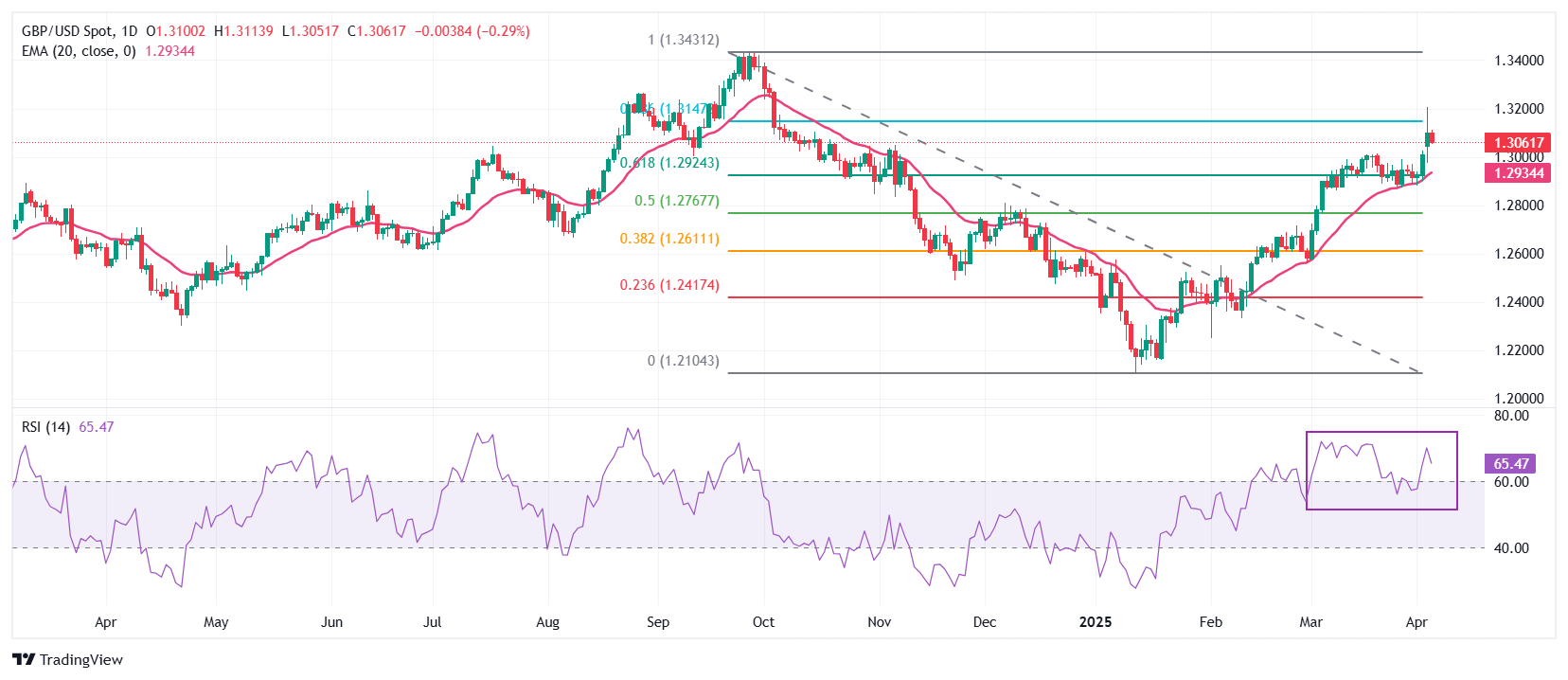Created
: 2025.04.04














![]() 2025.04.04 16:48
2025.04.04 16:48
The Pound Sterling (GBP) holds onto Thursday's gains above 1.3000 against the US Dollar (USD) during European trading hours on Friday. The GBP/USD pair trades firmly as the announcement of reciprocal tariffs by United States (US) President Donald Trump on Wednesday has resulted in shockwaves for the global and the domestic outlook.
On the so-called "Liberation Day", Trump swept a universal 10% baseline import duty, along with reciprocal tariffs on almost all of its trading partners, which were half of what they charge from the US. Trump's tariffs have jolted global equity markets as plans for fresh investments by business owners have been jeopardized.
Market experts believe that the imposition of full-scale import duties and potential countermeasures by US trading partners could temper global economic growth for a longer term. On Thursday, International Monetary Fund (IMF) Managing Director Kristalina Georgieva commented that higher levies by US President Trump clearly represent a "significant risk to the global outlook at a time of sluggish growth". Georgieva urged the US and its trading partners to work constructively to "resolve trade tensions and reduce uncertainty".
In the US, firms were already worried that tariffs could potentially impact business activity, and now, harsher-than-expected duties would weaken their confidence further. The Institute for Supply Management (ISM) showed this week that the New Orders Index of March in both the manufacturing and the services sector came in significantly lower than in February.
In Friday's session, investors will focus on the US Nonfarm Payrolls (NFP) data for March and Federal Reserve (Fed) Chair Jerome Powell's speech, which are scheduled in the North American session. The US NFP report is expected to show that the economy added 135K workers, lower than 151K hired in February. The Unemployment Rate is seen as steady at 4.1%. The impact of the employment data would be limited on market expectations for the Fed's monetary policy outlook as officials are more concerned about upside risks to inflation due to Trump's tariffs.
Investors will pay close attention to Fed Powell's speech to know how the central bank will battle potential tariff-driven inflation. Market participants would like to know whether the Fed will compromise its 2% inflation objective to address likely economic shocks.

The Pound Sterling grips gains above 1.3000 against the US Dollar on Friday. The GBP/USD pair rallied on Thursday after building base around the 61.8% Fibonacci retracement, plotted from late-September high to mid-January low, near 1.2930. The upward-sloping 20-day Exponential Moving Average (EMA) near 1.2934 suggests that the near-term outlook is bullish.
The 14-day Relative Strength Index (RSI) holds above 60.00, indicating an active bullish momentum.
Looking down, the 61.8% Fibonacci retracement at 1.2930 will act as a key support zone for the pair. On the upside, the September 26 high of 1.3434 will act as a key resistance zone.
The Pound Sterling (GBP) is the oldest currency in the world (886 AD) and the official currency of the United Kingdom. It is the fourth most traded unit for foreign exchange (FX) in the world, accounting for 12% of all transactions, averaging $630 billion a day, according to 2022 data. Its key trading pairs are GBP/USD, also known as 'Cable', which accounts for 11% of FX, GBP/JPY, or the 'Dragon' as it is known by traders (3%), and EUR/GBP (2%). The Pound Sterling is issued by the Bank of England (BoE).
The single most important factor influencing the value of the Pound Sterling is monetary policy decided by the Bank of England. The BoE bases its decisions on whether it has achieved its primary goal of "price stability" - a steady inflation rate of around 2%. Its primary tool for achieving this is the adjustment of interest rates. When inflation is too high, the BoE will try to rein it in by raising interest rates, making it more expensive for people and businesses to access credit. This is generally positive for GBP, as higher interest rates make the UK a more attractive place for global investors to park their money. When inflation falls too low it is a sign economic growth is slowing. In this scenario, the BoE will consider lowering interest rates to cheapen credit so businesses will borrow more to invest in growth-generating projects.
Data releases gauge the health of the economy and can impact the value of the Pound Sterling. Indicators such as GDP, Manufacturing and Services PMIs, and employment can all influence the direction of the GBP. A strong economy is good for Sterling. Not only does it attract more foreign investment but it may encourage the BoE to put up interest rates, which will directly strengthen GBP. Otherwise, if economic data is weak, the Pound Sterling is likely to fall.
Another significant data release for the Pound Sterling is the Trade Balance. This indicator measures the difference between what a country earns from its exports and what it spends on imports over a given period. If a country produces highly sought-after exports, its currency will benefit purely from the extra demand created from foreign buyers seeking to purchase these goods. Therefore, a positive net Trade Balance strengthens a currency and vice versa for a negative balance.
for
![]()
Created
: 2025.04.04
![]()
Last updated
: 2025.04.04

FXStreet is a forex information website, delivering market analysis and news articles 24/7.
It features a number of articles contributed by well-known analysts, in addition to the ones by its editorial team.
Founded in 2000 by Francesc Riverola, a Spanish economist, it has grown to become a world-renowned information website.
We hope you find this article useful. Any comments or suggestions will be greatly appreciated.
We are also looking for writers with extensive experience in forex and crypto to join us.
please contact us at [email protected].
Disclaimer:
All information and content provided on this website is provided for informational purposes only and is not intended to solicit any investment. Although all efforts are made in order to ensure that the information is correct, no guarantee is provided for the accuracy of any content on this website. Any decision made shall be the responsibility of the investor and Myforex does not take any responsibility whatsoever regarding the use of any information provided herein.
The content provided on this website belongs to Myforex and, where stated, the relevant licensors. All rights are reserved by Myforex and the relevant licensors, and no content of this website, whether in full or in part, shall be copied or displayed elsewhere without the explicit written permission of the relevant copyright holder. If you wish to use any part of the content provided on this website, please ensure that you contact Myforex.
Myforex uses cookies to improve the convenience and functionality of this website. This website may include cookies not only by us but also by third parties (advertisers, log analysts, etc.) for the purpose of tracking the activities of users. Cookie policy